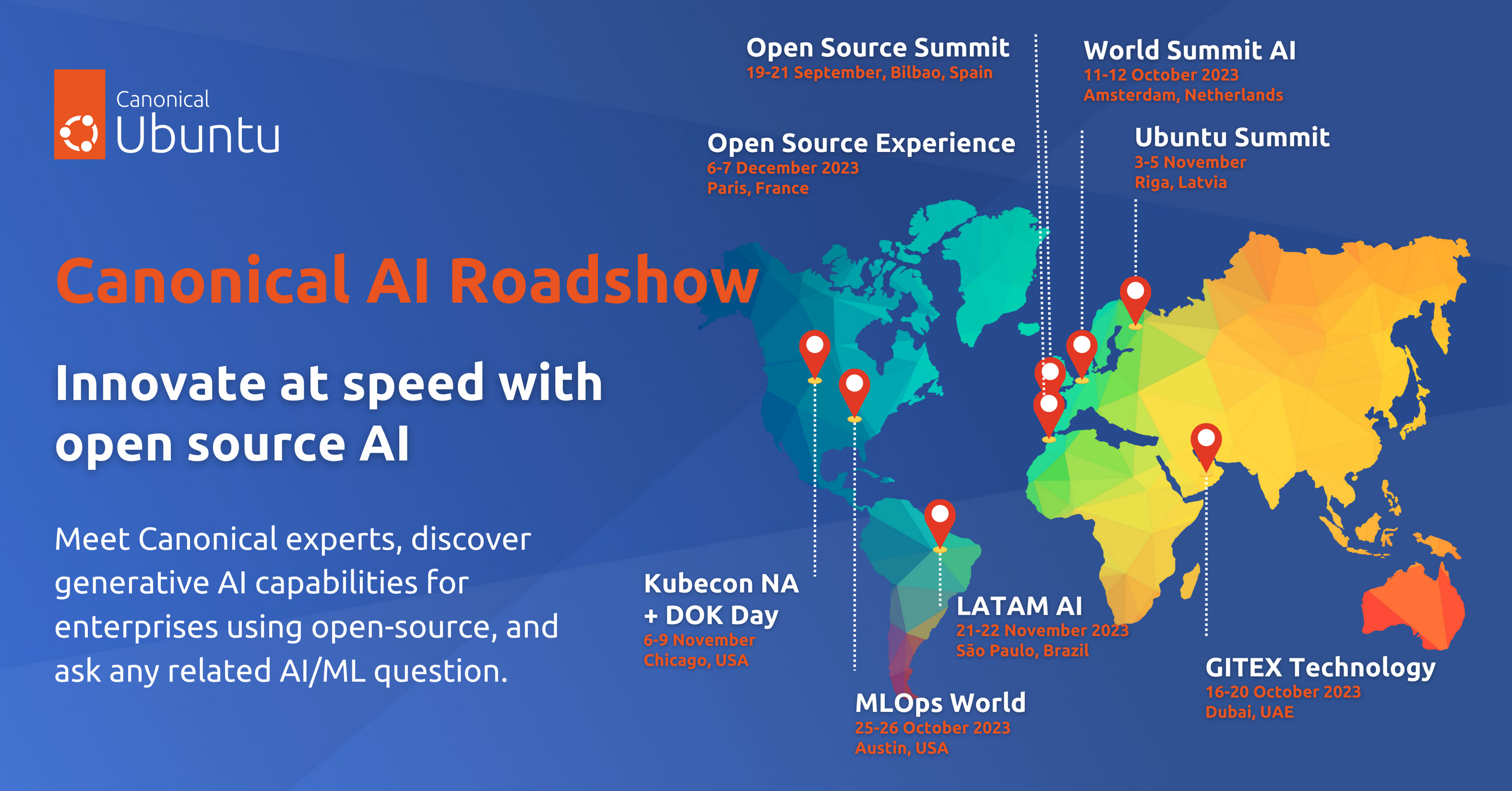Canonical
on 6 September 2023
Series of events will highlight generative AI use cases powered by open source software
London, UK. 6 September 2023. Canonical, the publisher of Ubuntu, is launching its first AI roadshow. The series of events and presentations will highlight how enterprises can make better use of their own data and make artificial intelligence (AI) use cases a reality.

AI is at the forefront of a revolution across industries and in the way we work. The widespread availability and free-to-use models of generative AI tools has accelerated the adoption of the new technology and challenged enterprises to rethink their strategies in order to stay competitive in the market. AI has proven invaluable in removing the burden of performing repetitive tasks and reducing time spent on gathering information. In fact, the spectrum of use cases for generative AI in enterprises is extremely broad.
AI use cases gaining traction
McKinsey reports that the technology’s impact on productivity is estimated to be up to $4.4 trillion. Industries like financial services, technology and life sciences have started reaping the benefits. AI is predicted to make a lasting difference in these sectors, with research and development in areas like DNA sequencing, real-time payments, and transaction monitoring. More popular applications, such as content generation, chatbots, and sentiment analysis, have also long been attractive to organisations.
While the use cases of generative AI are all the hype at the moment, predictive analytics are in a more advanced state of adoption. Countless applications have been rolled out and are in production. The area of sales operations, for example, has benefited from use cases related to customer targeting, churn prevention, and sales forecasting.
Challenges with enterprise AI adoption
Even though the impact of AI technology is evident, many businesses face a range of challenges with making the promise of AI a business reality. Notably, security and compliance concerns remain unaddressed and pose specific challenges to each enterprise. Organisations also need to be vigilant from an ethical perspective and avoid bias in their solutions. And finally, there is a significant skills gap in the market, with very few professionals that possess deep knowledge of generative AI, large language models (LLMs), or advanced machine learning (ML).
As with any innovation, there can be a steep slope towards seeing a return on investment – even after overcoming these initial challenges. Canonical has been investing in tools dedicated to AI for over four years. The company has been focusing on the biggest challenges that companies face, from difficulties with setting up a working environment to determining the best path to scaling a project.
Canonical’s expanding big data and AI portfolio
Canonical is continuously growing its big data and AI tooling portfolio to provide customers with the latest tools and expertise. The company’s Charmed MLFlow solution, for example, enables professionals to perform experiment tracking during the development phase of the ML lifecycle. Charmed MLFlow is easy to set up and comes with integrations for tools like Jupyter Notebooks and MLOps platforms, such as Canonical’s Charmed Kubeflow. Canonical’s newly launched Charmed Spark is an open source solution that enables professionals to process streaming data at scale on any conformant Kubernetes environment, in the data centre or the cloud.
A global AI roadshow
The upcoming Canonical AI Roadshow, which kicks off on 19 September 2023, will showcase how Canonical technology can speed up companies’ AI journeys. A lineup of presentations, talks, interviews and case studies will focus on the latest trends in generative AI and the critical role of open source in driving innovation in this space. Canonical’s MLOps and Data Fabric solutions will be in the spotlight. The roadshow will also feature demos from industries like financial services and oil and gas.
Read more about the Canonical AI Roadshow for a full lineup or book a meeting with the team.



